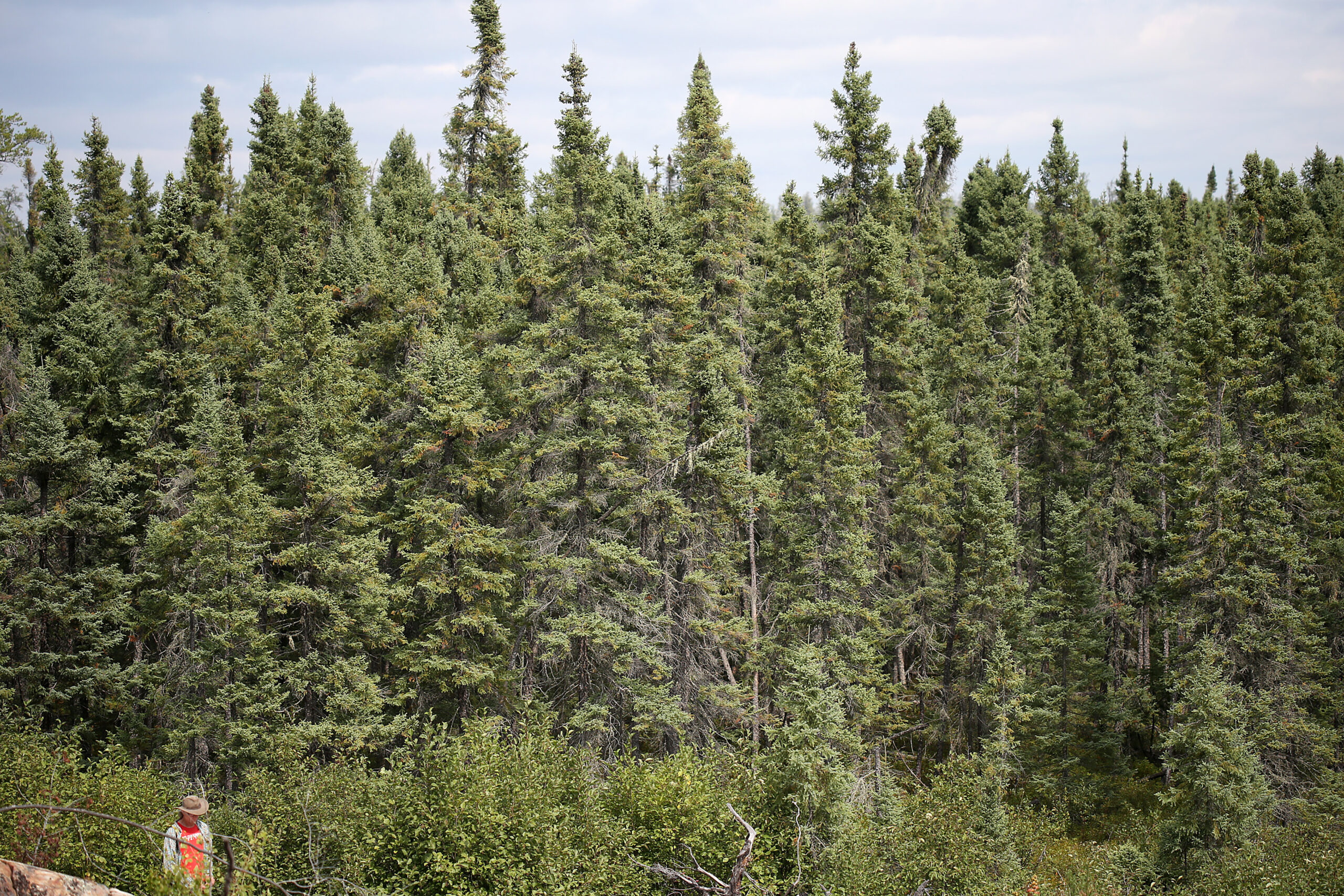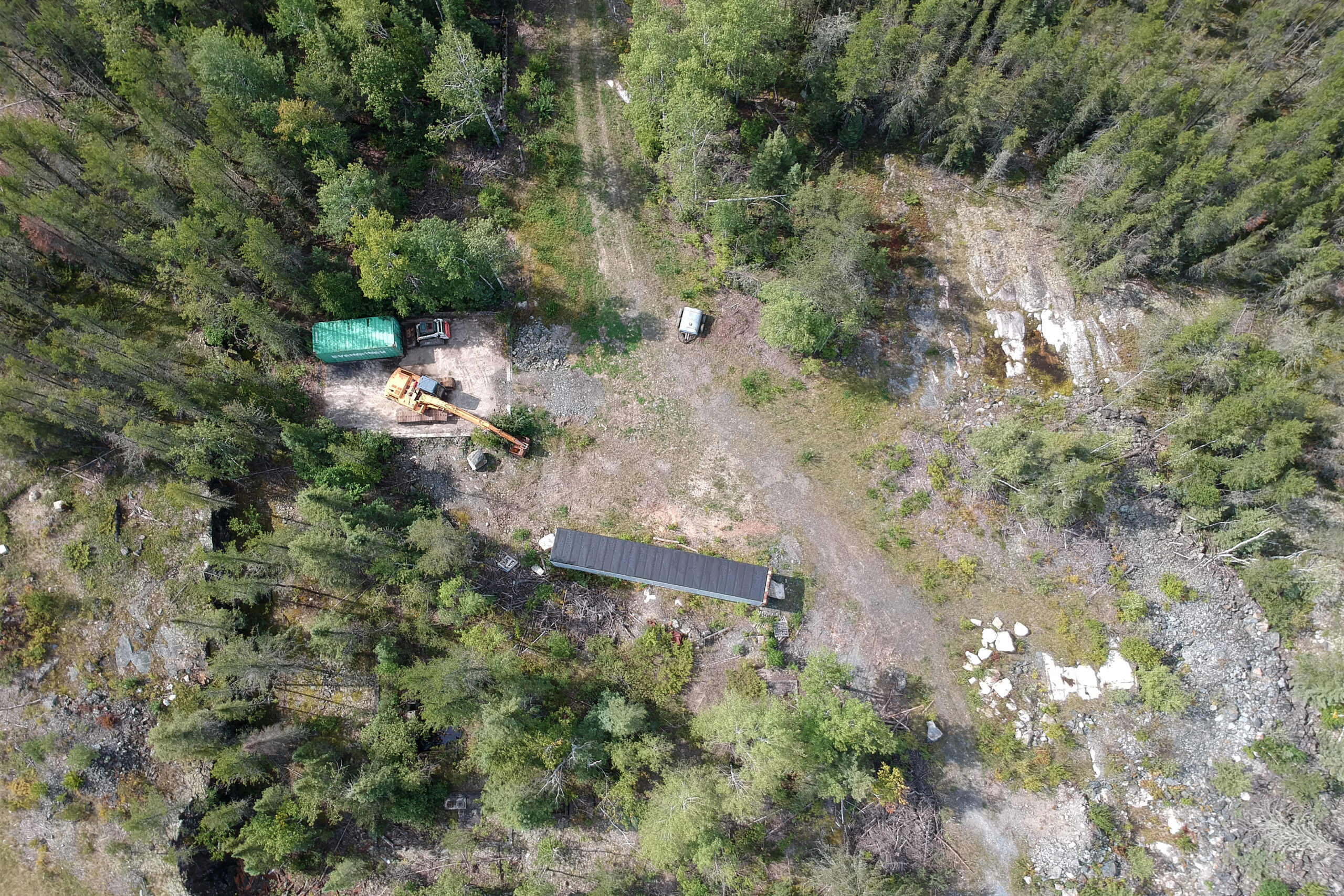
B.C.’s failure to fund flood response ‘troublesome’ as atmospheric river strikes again
Rising waters closed highways and forced evacuations, prompting fresh criticism that the province has been...
An Ontario-based company quietly staked exploration claims in protected caribou habitat within Nopiming Provincial Park this summer, just as the Manitoba government launched its strategy to expand the province’s critical mineral industry.
Manitoba’s public mining and quarrying maps show two claims — part of Grid Metals Corporation’s lithium exploration projects — cross into a “backcountry” area of the park that is protected from all mining development. The claims are part of a group staked between July 29 and August 7, according to a provincial database. They appeared on provincial mining maps August 29.
“By regulation, this is illegal under the provincial parks act,” Eric Reder, campaigner for the Manitoba Wilderness Committee, said in an interview.
Last week, Reder hiked through a black spruce bog to document evidence of the claims. Reder said the company cut down trees to make claim posts and left at least one treetop blocking a portage trail for the popular Seagrims Lake canoe route.

Meanwhile in the Manitoba election campaign, the Progressive Conservatives have announced a goal to double mineral exploration investments, furthering the push for mining activity.
Manitoba’s provincial parks are split into land-use categories delineating the types of activities permitted within park boundaries. Parts of Manitoba’s parks — including about 60 per cent of Nopiming — are designated specifically for resource extraction. Backcountry and wilderness land use categories are barred from industrial activities.
According to the provincial park systems plan, the 270 square kilometres of backcountry land in Nopiming Provincial Park is protected in an effort to conserve boreal forest and woodland caribou habitat — especially caribou calving areas — and to allow canoeing, fishing, hiking and other nature-oriented recreation.
Documents reviewed by The Narwhal and the Winnipeg Free Press show the Grid Metals claims have been staked within the Owl-Flintstone caribou herd occupancy area, near pockets of caribou calving and rearing lands. The Owl-Flintstone herd in Manitoba is considered high risk due to disturbances from development, according to the province’s 2015 caribou management strategy. Action plans for caribou protection have not been finalized in Manitoba.
Right now, the claims are listed as pending, meaning Manitoba authorities have yet to formally approve the claim. But the application form requires prospectors to confirm the land within the boundaries of the claim is not covered by mining restrictions.
In an emailed statement, a government spokesperson said “the branch is aware these claims were staked in a provincial park in an area of backcountry” and the boundaries will be reviewed by the mines branch as part of the application process.
This isn’t the first time claims have been staked within Nopiming’s protected lands. In 2020, the Wilderness Committee found evidence former government mines branch director Chris Beaumont-Smith had staked claims within backcountry land inside the park. (The claim was eventually adjusted online.)
Grid Metals Corporation’s CEO Robin Dunbar said he is “not sure on what basis the claims are reported to be in a restricted area.”
“It wouldn’t be our intention to stake a claim or conduct any exploration activity in an area not designated for legally staking claims,” he said in an email.
Grid Metals vice president of exploration Carey Galeschuk said the claim was a mistake. “It can be everything from a GPS error to errors made by the physical stakers,” he wrote. “Any errors that may exist will be corrected. These have only recently been staked by our contractor.”
“Exploration is never carried out in areas removed from staking,” he added.
Reder would like to see more formal accountability measures taken against errant mining claims.

“At some point the rather brazen prospectors need to understand that we have laws in place,” he said. “There should be a rehabilitation cost.”
Reder suggests fines for illegal claim staking could be collected and funnelled into park recreation programming or caribou research.
In response to questions asking whether Grid Metals’ claims are permitted under provincial regulations and what recourse is available should they be found to be breaching provincial rules, the government spokesperson wrote that under the Provincial Parks and Mines and Minerals Acts, the claims “are not permitted and will be rejected,” adding the company could be “required to remedy compliance failures,” though it’s not specified what remedies may be required.
The timing of the claim staking coincides with the week Manitoba released its critical minerals strategy, a document touting the Progressive Conservative government’s plan to revitalize the mineral industry through tax incentives and financial investments.
The mineral strategy promises a sustainable business environment for mining companies looking to invest in Manitoba, but makes little mention of plans to ensure environmental sustainability for the land.
“The principles of sustainable development have been codified in The Mines and Minerals Act and have become the legal framework to implement the concept in Manitoba’s mining sector,” the strategy reads.
During election campaigning this week, the Tories reiterated their commitment to the strategy, announcing a goal to double mineral exploration investments in the province to $310 million by 2030 and criticizing NDP pledges to protect 30 per cent of Manitoba lands and waters by 2030, adding the NDP is trying to “fund environmental groups that want to shut down mining.”
The Manitoba election will take place Oct. 3.
Julia-Simone Rutgers is a reporter covering environmental issues in Manitoba. Her position is part of a partnership between The Narwhal and the Winnipeg Free Press.
Six hundred samples. Roughly 180 sites across the Canadian Arctic. And more than 3,000 microbes providing more than four trillion pieces of data on the...
Continue reading
Rising waters closed highways and forced evacuations, prompting fresh criticism that the province has been...

The Sio Silica sand mine southeast of Winnipeg was proposed, then rejected, then reviewed, then...

An excerpt from “We Survived The Night” by Julian Brave NoiseCat
